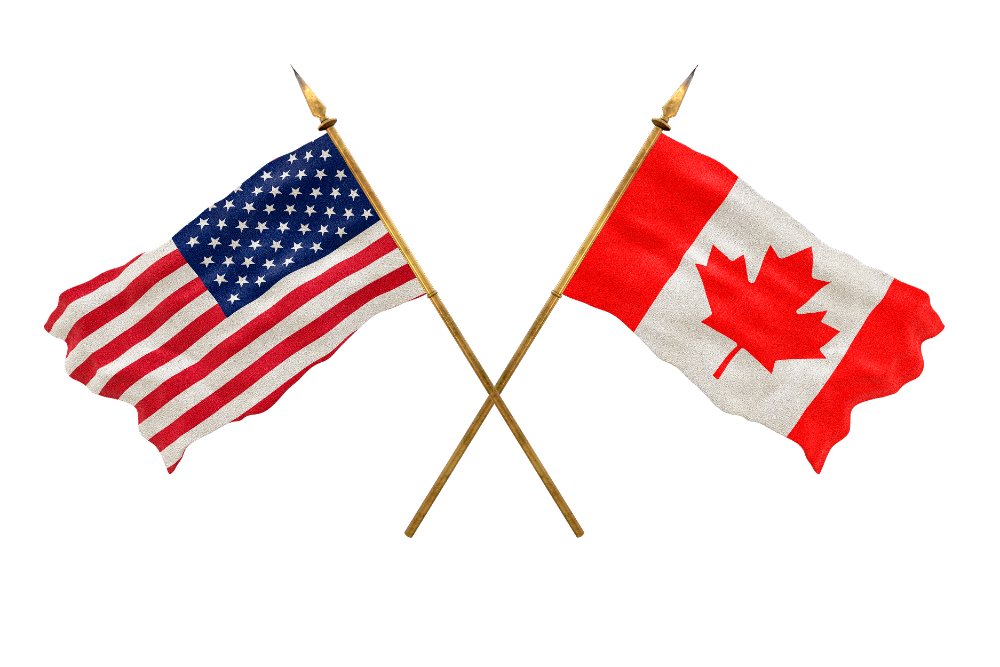Choosing the right destination for higher education is no small feat, especially when you’re considering studying abroad. The USA vs Canada debate is popular among international students. Both countries are known for their excellent education systems, vibrant cultures, and opportunities for growth.
When comparing the USA vs Canada for higher education, it’s no surprise that both stand as top contenders for Indian students. But what makes these destinations so appealing?
According to the Open Doors 2025 Report, international student enrollment in the United States reached a record high of nearly 1.2 million (1,177,766) during the 2024/25 academic year. India solidified its position as the leading place of origin, with a record 363,019 students—a 10% increase from the previous year.
So, which country is the best fit for you? Let’s explore and find out.
Key Highlights:
Choose your dream country
When do you want to study abroad?
What's your highest level of education?
Select you current city
How Leap will help you
Personalised University Shortlist
Express Applications with Quicker Admits
End-to-End Application Support
| Aspects | USA | Canada |
|---|---|---|
| Top Universities in the USA vs Canada for Indian Students | Massachusetts Institute of Technology (MIT) Harvard University Stanford University | University of Toronto University of British Columbia McGill University |
| USA vs Canada: Cost of Living (Without Rent) | INR 98.2K (USD 1.17K) | INR 86K (CAD 1.44K) |
| Best Masters Courses | Master of Business Administration (MBA) Master of Science in Computer Science (MSCS) Master of Science in Data Science (MSDS) | Master of Business Administration (MBA) Master of Engineering (Meng) Master of Computer Science (MCS) |
| Part-Time Work Hours for Students | 20 hrs/week | 20 hrs/week |
| Average Annual Salary in USA vs Canada | INR 49.8L (USD 59.4K) | INR 37.5L (CAD 63.1K) |
Top Universities: USA vs Canada
Did you know that there are over 5300 universities in the USA, out of which 16 universities rank in the top 50 by QS World University Rankings 2026?
On the other hand, Canada is home to 223 public and private universities and 213 public colleges and institutes, out of which 3 universities rank in the top 50 by QS World University Rankings 2026.
Below is a table highlighting the top 5 universities in the USA for Indian students, along with their average tuition fees:
| University | QS World University Rankings 2026 | Approximate Annual Tuition Fees |
|---|---|---|
| Massachusetts Institute of Technology (MIT) | 1 | INR 52L (USD 62K) |
| Harvard University | 5 | INR 47.4L (USD 56.5K) |
| Stanford University | 3 | INR 33.3L to INR 51.2L (USD 39.7K to USD 61K) |
| California Institute of Technology (Caltech) | 10 | INR 51L (USD 60.8K) |
| University of Pennsylvania | 15 | INR 51.2L (USD 61K) |
Here is the list of some of the top 5 universities in Canada for Indian students, along with their average tuition fees:
| Top University | QS World University Rankings 2026 | Approximate Annual Tuition Fees |
|---|---|---|
| University of Toronto | 21 | INR 38L (CAD 64K) |
| McGill University | 27 | INR 39L (CAD 66 K) |
| University of British Columbia | 38 | INR 33L (CAD 56K) |
| University of Alberta | 94 | INR 23L (CAD 39K) |
| University of Waterloo | 119 | INR 36L (CAD 61K) |
Top Courses: USA vs Canada
The USA is known for its cutting-edge programs in technology, business, and engineering. At the same time, Canada stands out for its focus on fields like healthcare, environmental sciences, and technology with an emphasis on sustainability.
Here is the list of the top 10 Courses in the USA vs Canada:
| Top Courses in USA | Top Courses in Canada |
|---|---|
| Communication & Media Studies | Business & Management |
| Business Administration | Engineering |
| Computer Science | Medicine |
| Engineering | Pharmacy |
| Data Science & Analytics | Dentistry |
| Public Policy | Health Sciences |
| Marketing | Media & Journalism |
| Biotechnology | Physiotherapy |
| Healthcare Management | Information technology |
| Finance | Applied and Pure Sciences |
Eligibility Requirements: USA vs Canada

A postgraduate degree abroad is a popular choice among students seeking higher education. Before you apply, it’s important to understand the eligibility requirements for studying in the USA and Canada. The requirements for both nations might vary based on the university and course you choose.
Here are the eligibility requirements for studying in the USA vs Canada:
Eligibility Criteria for USA
| Criteria | Details |
|---|---|
| Academic Qualifications | Completed secondary education equivalent to a USA high school diploma or Australia’s Year 12 qualification |
| English Proficiency | TOEFL (80 or above) IELTS (6.5 or above) |
| Standardised Tests | SAT/ACT for undergraduate programs GRE/GMAT for graduate programs |
| Financial Proof | Evidence of sufficient funds to cover tuition, living expenses, etc. |
Eligibility Criteria for Canada
| Criteria | Details |
|---|---|
| Academic Qualifications | Undergraduate: Minimum 70-80% in 12th grade Postgraduate: First-class bachelor’s degree |
| English Proficiency | Evidence of sufficient funds for tuition, living expenses, etc. |
| Letter of Acceptance | Acceptance letter from a recognised Canadian institution |
| Financial Proof | Evidence of sufficient funds for tuition, living expenses,etc. |
Cost of Studying: USA vs Canada
Tuition fees is a key aspect, particularly for studying abroad, that can impact your choice for USA vs Canada.
The cost of studying in Canada is more affordable, particularly at private universities, whereas tuition fees for USA courses is higher and can vary based on your study level and the location within the USA where you are studying.
Here are the key details for your reference.
| Study Level | USA | Canada |
|---|---|---|
| Undergraduate degree | USD 20,000 – USD 40,000 (INR 17L - INR 33L) | CAD 15,000 - CAD 54,000 (INR 9L - INR 32L) |
| Post Graduate | USD 20,000 – USD 45,000 (INR 17L - INR 38L) | CAD 13,000 - CAD 45,000 (INR 8L - INR 27L) |
| MBA | USD 60,000 - USD 80,000(INR 50.3L - INR 67.1L) | CAD 34,000 (INR 20L) |
| PhD Course | USD 28,000 – USD 55,000 (INR 23L - INR 46L) | CAD 7,000 - CAD 15,000 (INR 4L - INR 9L) |
Cost of Living: USA vs Canada
The cost of living in the USA (including rent) is 16.2% higher than in Canada. In fact, the restaurant prices are also 13.9% higher than in Canada.
Let's break down the cost of living in both countries to help you estimate your overall budget.
| Aspect | Monthly Cost in USA | Monthly Cost in Canada |
|---|---|---|
| Living Cost (Without Rent) | INR 98K (USD 1.16K ) | INR 86K (CAD 1.44K ) |
| Accommodation | INR 1.35L (USD 1.6L ) | INR 2.10L (CAD 3.52K ) |
| Food | INR 1.69K (USD 20 ) | INR 1.49K (CAD 25 ) |
| Transport (Monthly Pass) | INR 5.51L (USD 65 ) | INR 6.28K (CAD 104.90 ) |
Please note: The cost of living in both countries will vary depending on your lifestyle and the city you choose to live in.
Also Read: Cost Of Living In Canada For Indian Students [2025 Updated]
Scholarships in USA vs Canada for Indian students
In the 2024-25 academic year, over 1L scholarships are awarded to International students in Canada. Additionally, over 1.7 million scholarships are awarded annually in the USA.
Here is a table of scholarships available for Indian students in the USA vs Canada:
| Top Scholarships in USA | Top Scholarships in Canada |
|---|---|
| Fulbright Scholarship | Vanier Canada Graduate Scholarship |
| Inlaks Shivdasani Foundation Scholarships | Ontario Graduate Scholarship |
| Tata Scholarships | President's International Scholarship of Excellence |
| Stanford University Scholarship | Lester B. Pearson International Scholarship Program at the University of Toronto |
| Aga Khan Foundation International Scholarship | International - Entrance Excellence Scholarship |
Learn more about the Scholarships in USA or Scholarships in Canada.
Student Visa Requirements: USA vs Canada

Did you know that the USA has a high visa acceptance rate of approximately 64% as compared to Canada, which has a slightly lower acceptance rate of 51%?
However, the visa processes, costs, and regulations differ significantly between the two countries.
Here is a table of detailed information regarding the Visa process in the USA vs Canada.
| Parameters | USA | Canada |
|---|---|---|
| Visa | F-1 Student Visa | Canada Study Permit |
| Cost | INR 13,363 (USD 160) | INR 9,000 (CAD 150) |
| Work Regulations | -20 hours per week during academic sessions-40 hours per week during breaks | -20 hours per week during academic sessions-40 hours per week during breaks |
| Processing Time | 10 days – 1 year | 6 - 8 weeks |
| Eligibility | Acceptance into a full-time program requiring more than 18 hours of study. | Accepted into a Designated Learning Institute (DLI) |
| Documents Required | -Passport-size photographs -Passport -Transcripts -English language proficiency test scores -Standardised Test Scores -Fee receipt -Financial documents | -Passport-size photographs - PAL -Passport -Transcripts -English language proficiency test scores -Standardised Test Scores -Fee receipt -Financial documents - Medical exam |
Post Graduate Work Visa: USA vs Canada
Deciding where to study abroad is a big decision, but planning your career path after graduation is equally important. Are you curious about which country offers better opportunities to stay, work, and potentially secure a pathway to permanent residency?
Let's see the details and decide which country might suit you better.
Post Graduate Work Visa in USA
The USA Optional Practical Training (OPT) program offers an exciting opportunity to stay and work in the country in your desired field after completing your studies. OPT allows F-1 visa holders to work in the USA for up to 12 months (with extensions for certain fields like STEM).
Key Features of Post Graduate Work Visa
| Aspect | Details |
|---|---|
| Duration | Up to 12 months; additional 24-month extension (36 months total) for STEM degrees. |
| Flexibility | Work in any job related to your field of study; no restrictions on employer or location. |
| Eligibility | -Complete at least one academic year at a U.S. institution on an F-1 visa; -Apply before graduation. |
| Pathway to Residency | Can lead to an H-1B visa, a potential step towards a green card with employer sponsorship. |
| No Job Offer Required | Apply without a job offer; must secure a job within 90 days of approval to maintain status. |
Post Graduate Work Visa in Canada
If you're considering studying in Canada and want to stay after your studies to gain some work experience, the Post-Graduation Work Permit (PGWP) could be a great opportunity for you.
Key Features of Post Graduate Work Visa
| Aspect | Details |
|---|---|
| Duration | Valid for the same length as your study program, up to a maximum of 3 years |
| Flexibility | Work in any field and switch employers without restrictions |
| Eligibility | -Must complete a full-time program of at least eight months at a designated learning institution (DLI); -Apply within 180 days of receiving final grades |
| Pathway to Permanent Residency | Work experience from PGWP can support PR application through the Canadian Experience Class (CEC) under Express Entry |
| No Job Offer Required | Apply without a job offer and start job hunting immediately after graduation |
Career Opportunities: USA vs Canada
When exploring "USA vs Canada: Which is better for Indian students?" It’s crucial to research the career opportunities available in both countries. Both nations boast robust economies and thriving job markets, making them attractive choices for Indian students.
As of November 2024, the employment rate in Canada stood at 60.6%, while the USA employment rate is 59.8%.
Let’s explore the job roles in both countries.

Job Roles and Salary in USA
The USA is known for its dynamic, fast-paced economy and diverse range of industries, including technology, finance, healthcare, and entertainment.
Here’s an overview of key job roles and their average annual salaries in the USA:
| Job Role | Average Annual Salary |
|---|---|
| Nurse Practitioner | $121,610 (INR 1Cr) |
| Financial Manager | $139,790(INR 1.18Cr) |
| Software Developer | $127,260 (INR 1.07Cr) |
| IT Manager | $164,070 (INR 1.39Cr) |
| Physician Assistant | $126,010 (INR 1.06Cr) |
Job Roles and Salary in Canada
Canada offers a stable and growing job market, particularly in sectors like tech, engineering, and healthcare.
Here's a glimpse at some in-demand roles and their average annual salaries.
| Job Role | Average Annual Salary |
|---|---|
| Medical Anesthesiologist | CAD 555,552 (INR 3.32Cr) |
| Cardiologist | CAD 548,726 (INR 3.28Cr) |
| Surgeon | CAD 537,202(INR 3.21Cr) |
| Cloud Architect | CAD 209,234 (INR 1.25Cr) |
| Software Engineering Manager | CAD 202,949 (INR 1.21Cr) |
So, USA vs Canada: Which is better? Don’t worry! Leap Scholar can help you make the best choice with expert guidance, personalised counselling, and visa support. Take the first step towards a bright future abroad—sign up now!
Frequently Asked Questions
-
Q. Is it better to study in the USA or Canada?
Ans. Both countries offer excellent education, but it depends on your priorities. The USA excels in academic excellence, research opportunities, and diversity, while Canada provides affordability, a welcoming environment, and a smoother pathway to permanent residency. Consider your goals, budget, and preferences to decide.
-
Q. What is the salary in Canada compared to the US?
Ans. Salaries in Canada and the US vary by industry and location. However, Canada's cost of living is generally lower, making salaries more comparable. Average salaries in Canada range from $40,000 to $80,000 CAD(INR 23L - INR 48L), while in the US, they range from $40,000 to $100,000 USD(INR 34L - INR 85L). You should research specific industries and locations for accurate comparisons.
-
Q. Is quality of life better in Canada or the USA?
Ans. Both countries offer high standards of living, but Canada is often considered more affordable and socially progressive. Canada's universal healthcare, lower crime rates, and welcoming culture contribute to its quality of life. The US excels in innovation, entrepreneurship, and cultural diversity.
-
Q. Is it better to do a masters in the USA or Canada?
Ans. Consider your academic and career goals, budget, and preferences. The US offers academic excellence, research opportunities, and diversity, while Canada provides affordability, a welcoming environment, and a smoother pathway to permanent residency. Research programs, costs, and post-grad opportunities to decide.
-
Q. Why should I choose Canada over the US?
Ans. Canada offers affordability, a welcoming environment, and a smoother pathway to permanent residency. Canada's lower cost of living, universal healthcare, and social programs make it an attractive choice. Additionally, Canada's immigration policies favour international students, making it easier to stay and work after graduation.
-
Q. What are the benefits of studying in the US?
Ans. The US offers many benefits, such as academic excellence, research opportunities, diversity, and innovation. Students gain access to world-class universities, cutting-edge technology, and a global network. The US also provides opportunities for internships, entrepreneurship, and career advancement.
-
Q. Which is better for PR: the USA or Canada?
Ans. Canada's immigration policies favour international students, making it easier to obtain permanent residency (PR) after graduation. Canada's Express Entry program and Provincial Nominee Programs (PNPs) provide a clearer pathway to PR. The US has more complex immigration policies but still offers opportunities for PR through employment-based visas.
-
Q. What are the major benefits of studying in the USA for Indian students?
Ans. Indian students benefit from the US's academic excellence, research opportunities, and innovation. They gain access to world-class universities, cutting-edge technology, and a global network. The US also provides opportunities for internships, entrepreneurship, and career advancement.
-
Q. What is the international student population in the USA?
Ans. The US hosts over 1.7 million international students annually, with India being one of the top countries of origin. International students contribute significantly to the US economy and cultural diversity. They bring unique perspectives, skills, and experiences, enriching the academic environment. Research universities and programs to find the best fit.
-
Q. Is it better to work in Canada or the USA?
Ans. Both countries offer excellent work opportunities, but you should consider your industry, skills, and preferences. Canada's job market is growing, with a focus on tech, healthcare, and sustainability. The US excels in innovation, entrepreneurship, and cultural diversity. Research job markets, costs of living, and work cultures to make an informed decision.
-
Q. Who pays more taxes, Canada or the USA?
Ans. Tax rates vary between Canada and the US, depending on income levels and locations. Generally, Canada has higher taxes but provides universal healthcare and social programs. The US has lower taxes, but healthcare and social programs are often employer-sponsored. Research tax policies, deductions, and credits to understand the implications.
-
Q. Is it safer to live in Canada or the USA?
Ans. Both countries are generally safe, but crime rates vary by location. Canada is often considered safer, with lower crime rates and stricter gun laws. The US has higher crime rates in some cities, but law enforcement and community programs work to ensure public safety.















Have Questions? Get Guidance to reach your Dream University
Connect with India's finest counsellors and biggest study abroad community.
Get Guidance